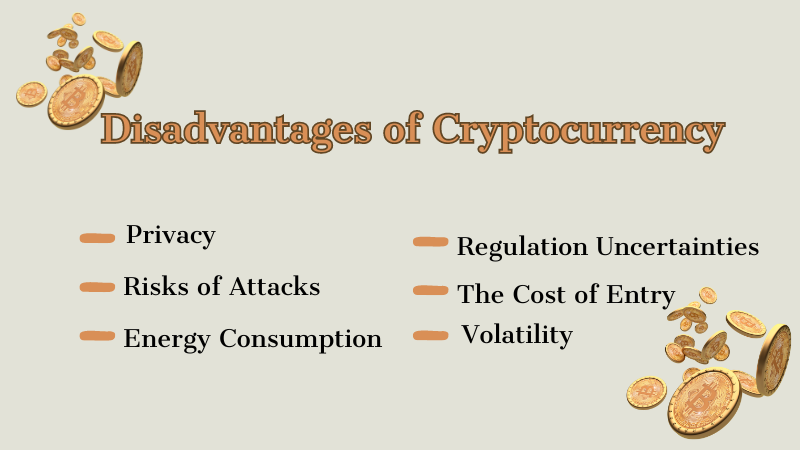Cryptocurrency advantages and disadvantages are the good and bad sides of using cryptocurrencies. The goods include fast transactions, protection from inflation, cheaper international transfers, and more user control.
The bad involves uncertain rules and the risk of hacking. This information helps people understand what to expect from cryptocurrencies.
Cryptocurrency Advantages
Cryptocurrencies are getting more popular because they have some advantages over regular money. They can make quick and safe payments.
Inflation Hedge
Cryptocurrencies like Bitcoin have a limited amount that can ever be made, just like there’s only so much gold in the world. This limit is one of the advantages of cryptocurrency because it can help keep its value even when regular money might become less valuable due to inflation.
Since there’s a cap on how many Bitcoins can exist, they could become more valuable as more people want them, acting like a safety net against the dropping value of regular money.
Transaction Speed
Cryptocurrency transactions are known for being fast. Unlike bank transfers which can take a long time, especially when sending money to another country, crypto payments can happen quickly.
This is because they use blockchain networks that don’t need to go through banks. One of the cryptocurrency advantages is that you can send money anywhere, anytime, without waiting.
For example, if you use Bitcoin to pay a friend in another country, they could get the money in just a few minutes.
Cutting Costs
Cryptocurrencies can save you money on fees because they don’t need as many middlemen as regular banks do. This is especially true when you’re sending money to another country.
One of the advantages of cryptocurrencies is that they can make these international payments cheaper. For example, if you use Bitcoin to send money overseas, you might pay less in fees than if you did a wire transfer through a bank.

Decentralization
Cryptocurrencies work differently from regular banks. Instead of having one place that controls everything, they use many computers worldwide.
This makes them safer because it’s harder for things to go wrong or for one person to take control. It also makes people feel more in charge of their money.
For example, when you use Bitcoin, your transaction isn’t just in one bank’s hands. It’s checked and recorded by many computers. This means if one computer has a problem, your Bitcoin is still safe and the system keeps working.
Diversity
There are lots of different kinds of cryptocurrencies, each with its special features and uses. People can choose the ones that match what they want, whether to keep their money safe, to use for buying and selling, or to use within a certain online community.
For example, Ethereum is a popular cryptocurrency that is not just for trading. It’s also used to create and run smart contracts, like automatic agreements that work by themselves on the internet.
Open Access
Cryptocurrency is easy for anyone to use. If you have the internet and a digital wallet, you can use crypto. You don’t need a bank account, which is great for people who don’t have one.
Imagine, with a cryptocurrency like Dogecoin, people can send and receive money quickly and with low fees, no matter where they live. This can be especially helpful for those who can’t use regular banks. Also, you can read about the best crypto-friendly banks.
Security
Cryptocurrency systems use complex codes to keep transactions safe. This high-tech security helps make sure that the transactions are done correctly and that no one can mess with them. This trustworthiness is like having a super-strong lock on your digital money.
Like every time someone wants to send or receive Ether (the currency of Ethereum), the transaction is locked down with a unique code. Only the person sending or receiving the Ether can use this code to secure the transaction.
Ledger Transparency
Blockchain technology’s clear design means every transaction is saved on a ledger that everyone can see. This openness helps build trust, ensures people are responsible for their actions, and makes it easier to check transactions without giving away private information.
Convenience
Trading different cryptocurrencies or turning them into regular money has become much easier. This helps the world economy because people can easily move and handle their money in various currencies and on different websites.
Disadvantages of Cryptocurrency
Cryptocurrencies have some big downsides along with their perks. It’s important to think about things like privacy problems and the impact on the environment.
If you’re getting into cryptocurrencies, you should keep these issues in mind.
Privacy
Cryptocurrencies use codes instead of real names, which makes it hard to tell who’s who. This can be a problem because it’s tough to catch people using digital money for bad things, like hiding stolen cash. Police and other officials have difficulty keeping an eye on these secret transactions.

Risks of Attacks
Cryptocurrencies are online and can be stolen by hackers. People have lost their digital money when hackers break into places where it’s traded or stored.
Bad software and trick emails can also let thieves get the secret codes they need to take money without permission.
Energy Consumption
Mining some digital currencies uses a lot of power, which is bad for the environment:
- Bitcoin and others like it use a system called Proof of Work (PoW) that needs a lot of electricity. This makes their carbon footprint bigger.
- As miners compete to get coins, they keep buying new and more powerful equipment. This uses even more energy and creates a lot of electronic trash.
Regulation Uncertainties
Cryptocurrency isn’t fully regulated yet, so the rules can change often, making the market unstable. This also means there’s a higher chance of scams.
Since there aren’t strong rules like in regular finance, people who invest in or use cryptocurrencies might not have much protection if something goes wrong.
The Cost of Entry
Cryptocurrency mining can be expensive because you need to buy costly gear and use a lot of electricity. This makes it hard for regular people to get involved.
Also, big groups called mining pools often take over the mining process, which goes against the idea of cryptocurrencies being spread out and not controlled by just a few. This is one disadvantage of cryptocurrencies.
Volatility
Cryptocurrency markets can be very up and down, which can be risky for people who invest in them and the general market. Prices can change a lot, which means investors might make a lot of money or lose a lot.
Because of these big price changes, it can be hard to use cryptocurrencies like regular money for buying things every day. This is one of the disadvantages of cryptocurrencies.
Final Thoughts – Cryptocurrency Advantages and Disadvantages
Understanding cryptocurrency advantages and disadvantages is essential for anyone interested in digital currencies. While they offer quick transactions and financial independence, risks and uncertainties must be considered.
FAQs about Cryptocurrency Advantages and Disadvantages
What are advantages of cryptocurrencies❓
Cryptocurrencies offer fast transactions, protection against inflation, lower international transfer costs, and increased user control.
What are disadvantages of cryptocurrencies❓
The downsides include regulatory uncertainty and the potential for security risks like hacking.
Are cryptocurrency transactions fast❓
Yes, cryptocurrency transactions can be much faster than traditional bank transfers, especially across borders.
Is it safe to use cryptocurrencies❓
While they offer robust security features, there’s still a risk of hacking, so it’s important to take precautions.
How do cryptocurrencies affect the environment?❓
Cryptocurrency mining, especially for coins like Bitcoin, consumes a significant amount of electricity, leading to a high carbon footprint and electronic waste.

